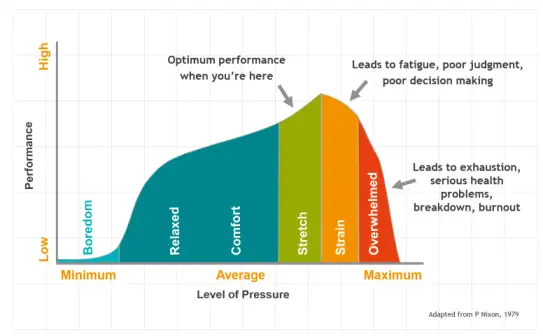When you think of stress, you no doubt think of a situation similar to this picture. A situation of discomfort, strain and pressure, which could be caused by innumerable reasons. While this is definitely one form of stress, stress is also something that can also make you feel excited, motivated and challenged.

Types of Stress
As I’ve alluded to above, there are actually two types of stress that we encounter within our lives:
Eustress
Eustress is a positive stress, that will tend to have the following characteristics:
- Motivates you
- Is short-term
- Feels exciting
- Feels within our ability to cope
Eustress happens when you’re put into a position where you’re stretched but not past our perceived capability to cope. Things like starting a new job, buying a home, marriage or having a child, these are all stressful activities but I would hope an overall positive one.
Distress
Distress is the form of stress that we normally associate with the word “stress”. It tends to be characterised with the following traits:
- Feels unpleasant
- Feels to be outside of our ability to cope
- Causes anxiety
- Can be short or long-term
Pressure – Performance Curve
The pressure performance curve is a diagrammatic representation of the ability of an individual against the level of situational stress. As everyone is unique the levels of pressure and performance levels are obviously relative.

Source: https://rubica.co.uk/insights-resources/top-tips-for-building-team-resilience
On the right we can see the minimum level of pressure, this leads to situations where you find yourself bored. This could be something like doing a large amount of photocopying. This is something that you’re unlikely to find taxing without there being some additional conditions around the issue.
We then move into the relaxed and comfortable region, this is where you may have been doing something for a while. While it may have excited you and been a challenge at the beginning, it’s now comfortable and rarely challenging.
The Stretch area is where you will really come into your own. Tasks are difficult enough that you feel challenged but not so difficult that you feel that you’re unable to achieve it. It is important to note that while you’re able to work in this region for a while, continually being in this region for a long while will move you towards strain. It is, therefore, important that you have breaks to relax spread out over the year.
We then move into the Strain and Overwhelmed side of things. These are when you are moving from eustress into distress. When you are in this region you are likely to start suffering from impaired judgement and decision making. This is on top of the likelihood of suffering from exhaustion and if you remain overwhelmed for an extended period of time potential physiological issues. (http://www.apa.org/helpcenter/understanding-chronic-stress.aspx)
Dealing with Stress
I won’t look at how to give yourself more stress, as this can easily be achieved by finding a more challenging role or taking on new responsibilities. I will, however, look at dealing with stress and methods for decreasing it.

It is important to realise that we work in a competitive and stress filled world. Every one of us will find times when we will start to stray into the strain and overwhelmed side of the graph. Being able to identify when we are feeling stressed and finding ways of reducing it that work for us is important.
I have listed some of the most common recommendations around managing stress below but will take the opportunity to go into a few more in a little more detail afterwards.
- Stepping away from the problem, taking a walk
- Taking deep breaths
- Physical Activity
- More sleep
Recognise that talking to people is not a sign of weakness
While we all know that we can and should talk to our managers if we are struggling there is a great hesitancy to do so. Some of the reasons that we may decide against doing this are:
- Within our culture, we associate being busy with being successful. If we feel we aren’t able to keep up then this must mean that we aren’t successful.
- Our desire to appear to be in control
- Not wanting to feel that we are letting the team down by struggling with our workload.
- Concern about the impact of sharing our struggles may have on review round and promotion cases.
No one likes talking about where they are struggling but it can be very helpful if only for saying what the problems are out loud and getting someone else’s perspective on them. If initially speaking to your manager about it seems intimidating then try speaking to a close friend or colleague first.
Think about what is the absolute worst case outcome
This is something that I know I personally struggled with. One of my core values is punctuality, I find the idea of being late almost physically painful. Therefore I struggle with missing deadlines, pushing both myself and my team to meet them.
Eventually, I had a chat with my career manager who challenged me with the question “What is the worst case of you missing the deadline?”. I have to admit, I was initially stumped, “missing a deadline” was a big ‘no-no’ to me. After being pressed to provide an answer, I was only able to come up with there being a delay and people being disappointed. Both of these are obviously undesirable but neither of them are unresolvable or would even necessarily reflect badly on the project. Thinking this through can help you rationalise what the worst case outcome is and you will usually find it’s not as bad as you will have been building up to in your head.
Now, this is not always the case, if you’re managing a project with liquidated damages, where missing a deadline will result in financial repercussions, there are greater impacts. In these cases, there would be a greater interest from senior levels and hopefully greater support for when things aren’t going to plan.
Appropriate breaks
As mentioned above, while we want to be in the stretch region of the pressure-performance curve, being in the stretch region for extended periods of time can be a bad thing. It is, therefore, advisable to try and make sure there are opportunities for you to relax and destress throughout the year.
I’m personally terrible at taking holiday, I end up getting to the end of the holiday year finding that I’ve taken a couple days and have the rest of my allocation unused. To prevent that, I’ve taken the approach of looking at when the bank holidays are then adding some time onto each of these to get nine days off for the price of four. This still leaves days to use for holidays away, Christmas and things like that but helps avoid that last minute rush at the end of the holiday year.
Learn to recognise when you’re starting to feel stressed
While most people know what it feels like to be stressed being able to recognise it earlier allows us to catch it early.
An exercise that I was shown to help build recognition, is to imagine something very stressful, a job interview, public speaking or finding that your computer has a virus (WannaCry?). Now where in your body you do feel it? Personally, I feel the stress in my chest, a tense, almost crushing sensation. The feeling you’re experiencing while imagining it is likely to be much milder than if you were in those actual situations but this level will give you an idea of how it will feel when you’re starting to get stressed.
Knowing this feeling can give you the prompt you need to start taking pre-emptive actions to prevent you from slipping into distress.
Summary
Finding the right level of stress can be a difficult task and isn’t something that you can do once and be done with. Hopefully, in this post, you’ve learned something that will help you in managing your stress to keep you from slipping into distress or, at least, the knowledge that being stressed is common and is nothing to be ashamed of.
I’d love to hear if anyone else has methods that they’ve used to help keep themselves from slipping into distress.